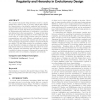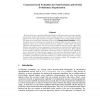2180 search results - page 355 / 436 » Self-Adaptation in Evolving Systems |
GECCO
2005
Springer
15 years 4 months ago
2005
Springer
Recurrent neural networks are theoretically capable of learning complex temporal sequences, but training them through gradient-descent is too slow and unstable for practical use i...
GECCO
2005
Springer
15 years 4 months ago
2005
Springer
For computer-automated design systems to scale to complex designs they must be able to produce designs that exhibit the characteristics of modularity, regularity and hierarchy –...
ICCBR
2005
Springer
15 years 4 months ago
2005
Springer
While several researchers have applied case-based reasoning techniques to games, only Ponsen and Spronck (2004) have addressed the challenging problem of learning to win real-time ...
ICES
2005
Springer
15 years 4 months ago
2005
Springer
While the fault repair capability of Evolvable Hardware (EH) approaches have been previously demonstrated, further improvements to fault handling capability can be achieved by exp...
NIME
2005
Springer
15 years 4 months ago
2005
Springer
When learning a classical instrument, people often either take lessons in which an existing body of “technique” is delivered, evolved over generations of performers, or in som...


